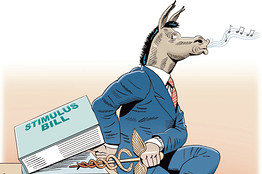Stealth Reform, by Grace Marie-Turner
Congressional leaders are arguing over whether they’ll get a comprehensive health reform bill passed this year or next. But, in fact, major health reform is speeding through Congress in two bills that are on the fast track to enactment — SCHIP and the economic stimulus bill.
Expansion of the State Children’s Health Insurance Program to children in families well into middle-income ranges passed the Senate yesterday and will likely be signed into law by President Obama early next week. In some states, children in families earning $100,000 or more would be eligible for taxpayer-supported insurance, as would adults already receiving it, clearly changing the mission of the program.
Sen. Roger Wicker (R-MS) asked, “Is the real intent of this legislation to replace the private health care system with a government-run health care system?” The response from Senate Democratic whip Richard Durbin (D-IL) was that he didn’t want to “trap people into private health insurance.” Heaven forbid!
Nine Senate Republicans broke ranks and voted with Democrats in favor of the SCHIP expansion; 40 Republicans crossed over and joined nearly all Democrats in passing the nearly-identical House version of the bill last week.
Nonetheless, the partisanship in the debate was evident: Sen. Charles Grassley, the top Republican on the Senate Finance Committee, said he was “disgusted” by the way Democratic leaders handled the debate. “It does not bode well for cooperative work in the coming months,” he told The Washington Post.
But the real game-changing health provisions are in the economic stimulus bill, where millions of Americans would be added to Medicaid and other taxpayer-financed health programs — without committee hearings or virtually any debate.
Here are some, but by no means all, of the health reform provisions in this gargantuan economic spending bill:
- Middle-class entitlement: Having redefined SCHIP as a program for middle-income children, the Congress wants to do the same with Medicaid. The stimulus bill would have the federal government pay 100% of the costs for states who extend Medicaid coverage to unemployed workers and their families, no matter what the families’ income or assets.
- Employer mandate: Employers would be forced to continue COBRA coverage for workers until they qualify for Medicare, even though it could significantly increase their health costs at a time many companies are struggling just to stay afloat.
- A new public program: The federal government would reimburse workers for at least 65% of the tab for COBRA coverage, creating a major new health spending program, without the slightest debate over whether this is the best mechanism or over the economic distortions this would cause.
- Federalizing medical decisions: The bill would create a Comparative Effectiveness council in which the federal government would rule on whether medical treatments are worth the money. HHS Secretary-designate Tom Daschle also would get a $400 million slush fund, likely used to set up his dream Federal Health Board to direct traffic in our $2.2-trillion health economy.
- HIT: The bill would spend more than $20 billion on health information technologies, despite the fact that no one has been able to come up with a workable plan to spend even a fraction of that amount wisely. “This is an attempt to squelch a growing private market that is competing to improve transparency and let consumers compare providers and costs,” Kimberley Strassel says in her Wall Street Journal column today entitled “Democratic Stealth Care.”
There are huge and far-reaching consequences to every one of these initiatives, and the American people know little or nothing about them, much less their huge ramifications.
Nonetheless, the left already is celebrating.
House Majority Leader Steny Hoyer gave “a rousing speech to a friendly audience of liberal health advocates, gathered in Washington for a conference sponsored by the left-leaning health advocacy group Families USA,” according to Congressional Quarterly.
But building consensus for reform is going to take time, and Hoyer warned that the next step in comprehensive health reform legislation could slip into next year.
That won’t sit well with Daschle, who wants Congress to act fast! He believes that the Clintons failed in their attempt at comprehensive reform by publicizing too many of the details of the plan in advance and letting debate last long enough for opponents to mobilize.
Does that mean he thinks that if too many people find out what’s actually on their reform agenda, they won’t support the bitter medicine? Is that really democracy in action, especially for health care, something that affects absolutely every American?
But with SCHIP and the stimulus bill, Daschle is getting his way with a big head start on a major expansion of the role of government in health care.
This chart from Heritage tells the full story about the direction we already are heading in government dominance of our health sector.
——————————————————————————-

